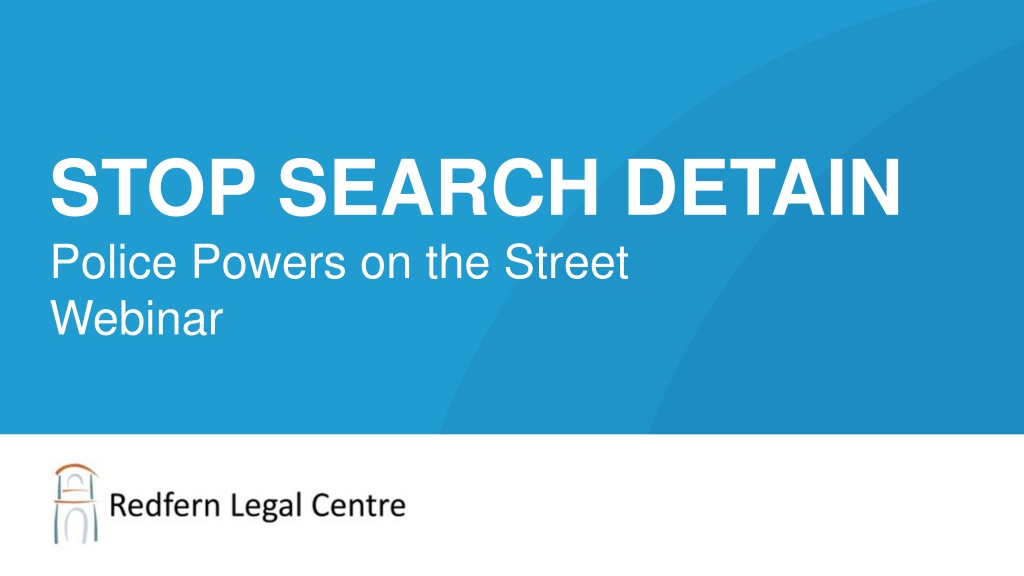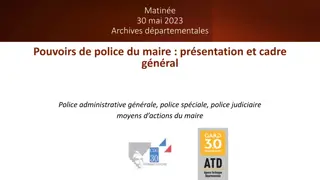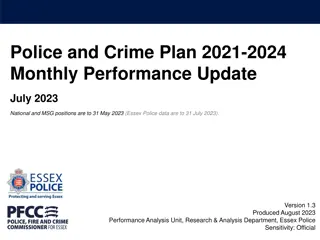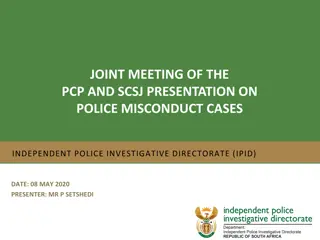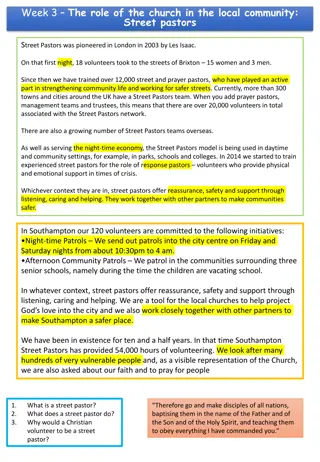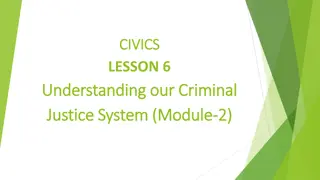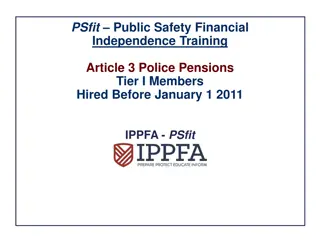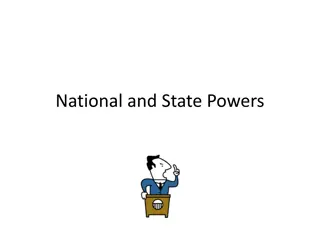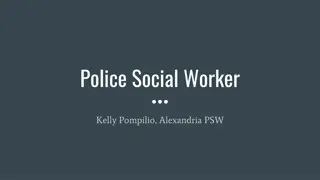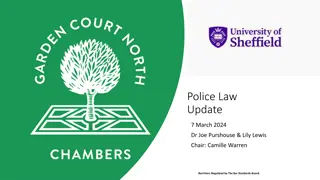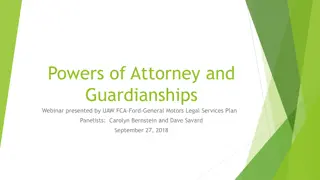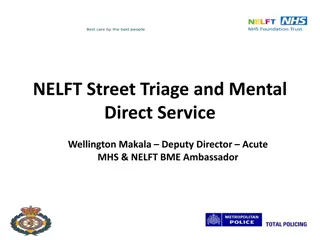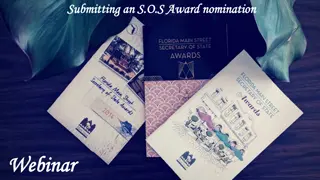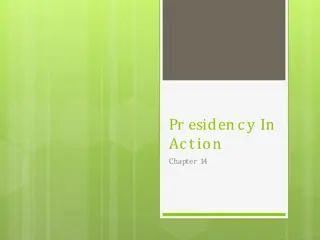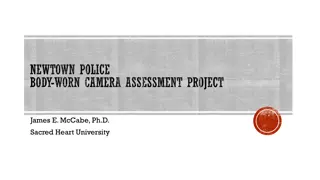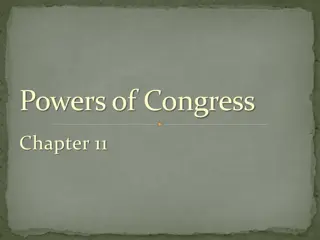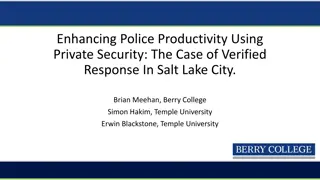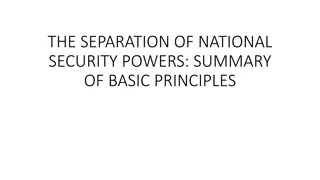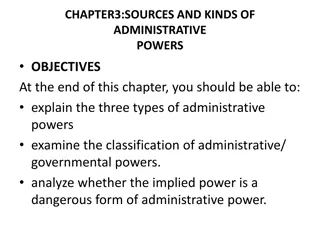Understanding Police Powers on the Street Webinar
Explore the powers and procedures of police officers on the street in this informative webinar featuring Sophie Leaver, a Police and Administrative Law Solicitor from Redfern Legal Centre. Topics covered include where police derive their powers, identity requests, personal searches, complaints processes, and more. Learn about the legal framework governing police actions and your rights in various interactions with law enforcement.
Download Presentation

Please find below an Image/Link to download the presentation.
The content on the website is provided AS IS for your information and personal use only. It may not be sold, licensed, or shared on other websites without obtaining consent from the author. Download presentation by click this link. If you encounter any issues during the download, it is possible that the publisher has removed the file from their server.
E N D
Presentation Transcript
STOP SEARCH DETAIN Police Powers on the Street Webinar
Sophie Leaver Police and Administrative Law Solicitor Redfern Legal Centre
Acknowledgement Of Country
Outline 1. Where do police get their powers? 2. Identity requests 3. Directions 4. Personal searches 5. Strip searches 6. Seizing property 7. Police complaints 8. LECC complaints 9. Compensation claims Resources & recording: www.rlc.org.au/training/resources/police
1. Where do police get their powers?
Sources of Police Powers 1. Law Enforcement (Powers and Responsibilities) Act 2002 (NSW) 2. Road Transport Act 2013 (NSW) 3. Bail Act 2013 (NSW) 4. Crimes (Domestic and Family Violence) Act 2007 (NSW)
Identity Requests Police DO have a right to ask for your name and address, but most of the time you don t have to answer. You must answer when: Police want to give a fine or a court attendance notice Police want to give you a direction to leave a place If Police reasonably suspect that you may have information about an indictable offence because you were at or near a place where an indictable offence occurred If you are driving In certain other situations
Safeguards Whenever police stop you and ask for your name and address, they must: Show evidence they are police (unless in uniform) Give their name and place of duty Explain why they are asking Give a warning that it is an offence not to comply They must do so before exercising the power.
Example 1: James James leaves his house and walks towards the train station on his way to work. Police stop James and demand his name and address. Questions 1. Does James need to give his name and address? 2. Did the police do anything wrong in this situation?
Example 2: Julia Julia leaves home and walks towards the train station, on her way to work. Police stop her and tell her that there was a violent incident outside her home 5 minutes earlier, which she may have witnessed. Police ask her for her name and address. Questions 1. Does Julia have to give her name and address? 2. Why?
Directions Orders to stop doing things or to leave a certain place for a period of time. Can only be made in public places : Places that are open to everyone (eg. streets, parks, beaches) Places with some entry restriction (eg. pubs, entertainment venues, railway platforms) Some places which are actually private property but do not belong exclusively to one person (eg. car parks, common areas in blocks of flats) Most common direction: move-on direction.
Move-On Directions A move on direction can be given if the police officer believes on reasonable grounds that your behaviour or presence in the place: is obstructing another person(s) or traffic, constitutes harassment or intimidation, is causing or likely to cause fear to another person(s), is for the purpose of supplying a prohibited drug, or is for the purpose of obtaining a prohibited drug.
What Directions Can Police Give? No rules in legislation It must be reasonable to reduce or eliminate the issue
Personal Searches under LEPRA Stop, search and detain - s21 LEPRA Search by consent - s34A LEPRA Search on arrest - s27 LEPRA Search in lawful custody - s28 A LEPRA Search pursuant to a warrant - s50 LEPRA LEPRA: Law Enforcement (Powers and Responsibilities) Act 2002 (NSW)
Search by consent Search by consent allows police to conduct a search even if the other conditions aren t met, so long as you consent. Problematic - Would you mind emptying your pockets? Can you show us what s in your bag? can be taken as consent to proceed with a search. People are likely to comply with police demands without realising they are unknowingly giving consent to a search.
Stop, Search & Detain Police may stop, search and detain you, if they suspect on reasonable grounds, that you have: Stolen goods Weapons Something used in connection with an offence A prohibited drug S21 LEPRA
Requirements Whenever police exercise a power to search a person, they must: Hold the state of mind required by LEPRA (reasonable suspicion) Comply with the rules for searching set out in s32 and s33 LEPRA Comply with the safeguard requirements in s15 LEPRA Make a contemporaneous record of the search.
State of Mind A reasonable suspicion involves less than a reasonable belief but more than a possibility. Some factual basis for the suspicion must be shown. What is important is the information in the mind of the searching officer at the time of the search. To form a reasonable suspicion, officers may rely on their observations of the person, and any information they have access to (eg. recent COPS entries).
Tips for dealing with police Ask if it is voluntary or whether police are requiring it. If they are requiring it, ask why. Sometimes it can be better to comply. Make it clear that you do not consent to a search.
Personal Search #1 Body search, frisk search, pat-down search Police can: pat you down ask you to remove outer clothing (coat, hat, shoes etc); ask you to shake your hair ask you to open your mouth look in your pockets and examine your possessions run a metal detector over your body
Personal Search #2 Police can t: Ask you to remove inner clothing Pull or lift your clothes Examine your body
Safeguards Police must provide you with the following information: Evidence that they are a police officer (unless in uniform) Their name and place of duty The reason for the use of this power This information must be provided as soon as reasonably practicable, or if there is a requirement, before that requirement. Part 15 LEPRA
Strip search Police can conduct a strip search if: 1. The officer suspects on reasonable grounds that the strip search is necessary for the purposes of the search. and 2. The seriousness and urgency of the circumstances make it necessary.
What is a Strip Search Something that goes beyond a personal search. It can include: Asking a person to remove clothing to allow a visual examination of the body. Asking a person to pull out their waistband to allow visual inspection. Asking a person to move their body for visual inspection (lift testicles, spread fingers and toes, lift their breasts, turn their body).
Preservation of dignity and privacy S32 LEPRA: Police officers conducting a search must: Inform you if and why removing clothing is necessary Ask for co-operation Conduct search quickly and provide reasonable privacy Conduct least invasive search practicable Must not search genital area or breasts (unless reasonably necessary) Police officer of the same sex to conduct search Search not to be conducted while person is being questioned
Strip search additional safeguards #1 Must be in a private area Must not be in presence or view of member of opposite sex or a person who is not necessary for the search Must NOT involve search of body cavities OR examination by touching the body. Must NOT involve removal of more clothes than reasonably necessary. Section 33
Strip search additional safeguards #2 Parent, guardian or representative may be present Children aged 10 18 and people of impaired intellectual functioning must have parent, guardian or representative. Section 33
Tips Ask the officer for their name and station Tell the officers that you do not consent to the search Ask the officers to turn their BWV (video camera) on Try to remember the details - the officers present and conditions of the search Call a lawyer
Issues with strip searches Increasing use of strip searches in recent years First Nations people and young people disproportionately strip-searched Not being used as a last resort Police officers not understanding the special requirements Lack of clear record keeping about the reasons for a strip search Used for intimidation or humiliation
Implications of an unlawful search CRIMINAL: Important in a defence if evidence found in an unlawful search leads to charges. CIVIL: Tort claims where unlawful search amounts to false imprisonment, assault, and/or battery.
Power to seize property Sections 21, 27 and 28A empower police to seize property found as a result of a search. Very broad powers - may seize anything found in that search . Police can examine property during a search but cannot compel you to unlock a phone or provide the password. Do not consent to police examining the contents of your phone.
What can you do about police misconduct? Police complaint LECC complaint Compensation/tort claim Learn about your rights
Police complaints What conduct can you complain about? Verbal abuse or inappropriate language Discriminatory behavior Failure to investigate (particularly in DV matters) Improper use of force Unlawful searches or arrests Lack of proper record keeping Failing to give appropriate information and/or warnings when exercising their powers
Complaints process Who can I complain to? Directly to the NSW Police Force; or To the Law Enforcement Conduct Commission (LECC) - the independent oversight body LECC only investigates the most serious misconduct. Most matters are referred back to the police for investigation, but LECC may decide to monitor the investigation. Formal complaints must be in writing. Best to seek legal advice before making a complaint.
Police Complaint outcomes NSWPF can decline to investigate a complaint for many reasons, e.g. too much time has passed or action has already been taken. If NSWPF decide to investigate, an independent officer will take on the case. At the end (usually within 90 days), you will be notified about whether your complaint was sustained or not sustained , and whether any disciplinary action was taken. Action can include training, dismissal, apology, dismissal, criminal charges.
LECC Complaint outcomes The LECC may decide to: Refer the matter to another agency or the NSW Police Force or NSW Crime Commission Request an investigation by the NSW Police Force or NSW Crime Commission and conduct an oversight of the agency s final investigation report Conduct further assessment enquiries Take no further action Undertake an investigation and provide an outcome.
Civil claims for compensation #1 TORTS - Assault, battery, false imprisonment, malicious prosecution Generally brought in the District Court Limitation periods - 3 years for personal injury, 6 years for general tort.
Civil claims for compensation #2 Best to seek legal advice about the merits of the claim and the risks of going to court. Try to provide: Detailed description of events Copy of all relevant police records (obtained through a Government Information (Public Access) Act 2009 (GIPAA) application CCTV or relevant footage Witness statements
Questions and More Information
Where to get free confidential legal advice on police powers Redfern Legal Centre runs a statewide police complaints practice Most community legal centres www.legalanswers.sl.nsw.gov.au/advice/about_clcs.html Legal Aid www.legalaid.nsw.gov.au/contact-us/legal-aid-nsw-offices
Questions? Sophie Leaver Police and Administrative Law Solicitor Redfern Legal Centre Resources and recording of this webinar: www.rlc.org.au/training/resources/police
Before You Go Your feedback helps us improve our training. Please stay with us for another 60 seconds Training: rlc.org.au/training Enquiries: Nick Manning education@rlc.org.au This workshop is a guide to the law in NSW, Australia. It is not a substitute for legal advice. If you have a legal problem, seek legal advice from a legal centre or Legal Aid.
